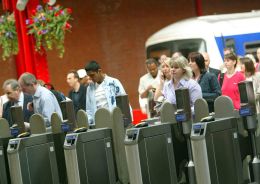Posted 16th November 2008 | 2 Comments
As rail traffic grows, road and air decline

Passenger growth on the UK rail network continues to grow.
WHILE the number of rail passengers in Britain continues at record levels — the highest for 60 years — road and air travel is declining.
The Department for Transport (DfT) has recorded two consecutive quarters where road traffic has decreased year on year – the first time for more than 30 years. At the same time, sales of new cars have fallen by 23 per cent and are at their lowest since 1996.
The number of heavy goods vehicles (HGVs) travelling on UK roads fell by four per cent during the third quarter of 2008. And the sale of new HGVs has collapsed — with Swedish manufacturer Volvo reporting just 115 heavy trucks sold over the past few months, compared to 41,970 during the same period a year ago – a 99.7 per cent fall.
According to the latest road traffic and congestion statistics for the three months to September this year, overall traffic levels fell by 2.2 per cent compared to the same period of 2007.
Meanwhile, the number of passengers travelling through BAA’s seven UK airports fell sharply last month as demand for air travel declined. The airports operator said it had handled six per cent fewer passengers year-on-year in October.
BAA traffic volumes have fallen for seven months in succession as demand for air travel has fallen under pressure from weaker consumer confidence and higher fares caused by rising fuel costs.
Elsewhere in Europe, Frankfurt airport reported passenger numbers had fallen by 4.9 per cent in October, while Airports Council International (ACI Europe) said overall passenger numbers at European airports fell by 3.3 per cent in September — and air cargo volumes were 7.2 per cent lower than a year ago.
“In tandem with airlines, airports are also being hit, as fewer passengers translate into declining revenues and their capital intensive nature exposes them to the current paralysis in financial markets,” said Olivier Jankovec, director general of ACI.
Among BAA’s London’s airports, Gatwick recorded the biggest decline, down 10.3 per cent, while Standsted’s passengers were down 6.3 per cent and Heathrow’s 3.7 per cent.
The fall in Gatwick air travellers was felt by the Southern rail passenger franchise, and Go Ahead Group has reported a “softening” of demand for rail travel to and from the airport — but otherwise Go Ahead, which also operates the Southeastern and London Midland franchises through its GoVia joint venture, reported rail passenger growth of up to 11 per cent between June and October.
National Express has reported similar growth on its Anglia and East Coast operations. Richard Bowker, chief executive, said many consumers were turning to rail, bus or coach, particularly when rising fuel costs were becoming an added burden.
Britain’s largest operator of passenger train franchises, FirstGroup, has reported a six per cent rise in passenger volumes in the first half of this fiscal year. Only one of its franchises, Capital Connect, showed a “marginal” slowdown in growth in September, which analysts have said was due to a slowing in London employment.
Arriva and Stagecoach have also reported passenger numbers growing up to 11 per cent so far this year.
• The Office of Rail Regulation publishes details of national rail trends every quarter. Its latest report, covering Quarter 1 of the 2008/9 fiscal year, showed rail passenger journeys in Britain totalling 311 million between April and June — an increase of 6.8 per cent on the previous year’s Q1, which compared to 7.3 per cent growth between 2006/7 Q1 and 2007/8 Q1.
Total freight lifted by train between April and June was 26.3 million tonnes, a 3.6 per cent increase on 2007/8 Q1.
Reader Comments:
Views expressed in submitted comments are that of the author, and not necessarily shared by Railnews.

Andrew Cholerton, Milton Keynes, UK
I agree - train operating companies in general (and Virgin in particular) seem obsessed by point to point times at the expense of providing high frequency services at higher speeds than could be achieved (legally!) on the roads. The 5 - 10 minutes of additional travelling time consequent upon making more frequent stops of is irrelevant to most travellers.
Geoff Steel, Northampton, United Kingdom
It will be extremely interesting to know actual loadings on the West Coast "Very High Frequency" service once it starts operation from 14th December, particularly as one of it's main objectives is to target airlines customers which from the report above is now indicating a sharp downturn in demand. The DfT have made no secret of their obsession with delivering the VHF strategy at the expense of a number of sizeable towns from Stafford through to Milton Keynes. I trust that in the event that the market share projected by the West Coast Strategy is not delivered due to the economic downturn the DfT will ensure that the stations that are about to lose regular pendilino services will see them reinstated rather than have to watch half empty trains (soon to be extended) speeding through the South Midlands without stopping.